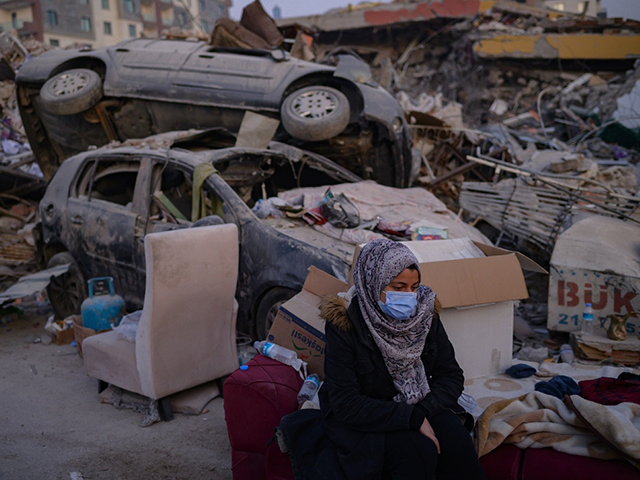Authorities in Turkey revealed on Thursday that they had identified 613 people “accused of making provocative posts” on social media related to the devastating earthquake that hit the country this week, arresting 78 and starting legal actions against nearly 300.
Turkey’s General Directorate of Security discussed these cases without detail, leaving unclear what about the content of their online posts was “provocative,” alongside legal action for authentic criminal activity such as “phishing” scams and arrests of real estate developers for violating building safety regulations, Reuters reported Thursday.
Turkey arrests 78 over earthquake social media posts
Turkish police said they have arrested 78 people accused of creating fear and panic by "sharing provocative posts" about last week's earthquake on social media#TurkeyQuake #Socialmediahttps://t.co/JzR8tkFT2Y pic.twitter.com/l7215VFaLv
— Moaz Abd-Alaziz (@MoazAbdAlaziz) February 16, 2023
Under Islamist President Recep Tayyip Erdogan, Turks have seen their freedom of speech eroded dramatically. Turkey has long had criminal provisions outlawing certain political speech, such as “insulting the president” and insulting Mustafa Kemal Atatürk, the founder of the Republic of Turkey and architect of the Armenian genocide. Following the alleged failed coup of July 15, 2016, however, the Erdogan regime moved swiftly to silence critics, imprison political dissidents, shut down media not reliably sympathetic to the regime, and gone as far as arresting people for posting online memes.
Erdogan is facing a presidential election this year, scheduled for June but potentially moved up to May or delayed indefinitely as a result of the earthquake. The Turkish government’s response to the earthquake has led to a groundswell of anger against his government for reacting too slowly in providing humanitarian aid to survivors and for its permissiveness in allowing real estate developers to build illegal, unsafe constructions near a fault line. Erdogan openly boasted in 2018 of the economic benefits of issuing a developer “amnesty” that allowed them to pay the government a fine to bypass necessary repairs to poorly constructed buildings, many of them residential high-rises that collapsed immediately last week.
Rescuers in Turkey and Syria are continuing to find survivors: A mother and her two children were rescued in Turkey’s Antakya – 228 hours after the first earthquake.
🔴 LIVE coverage ➡️ https://t.co/qrSajDwfOi pic.twitter.com/ygz39iU7sx
— Al Jazeera English (@AJEnglish) February 16, 2023
Eastern Turkey and northwest Syria suffered a 7.8-magnitude earthquake in the early morning hours of February 6, followed by a series of severe aftershocks peaking at 7.5 magnitude. At press time, the death toll in both countries has surpassed 42,000 and expected to grow as search teams dig through the rubble of collapsed buildings for bodies. Some of the greatest death tolls are expected in the large cities of Diyarbakir and Gaziantep, home now to thousands of homeless and displaced people.
Turkish police accused those arrested for social media comments since the earthquake struck, Reuters reported, of “creating fear and panic,” but did not offer examples of the alleged criminal content. Authorities confirmed that 20 of those impacted were in “pre-trial detention,” presumably for the most offensive posts. In addition to those arrested, Reuters noted, the government has shut down 46 websites for allegedly running “phishing scams” and otherwise trying to profit illicitly from hurricane victims. Among those shut down were pages meant to impersonate real charities working on the ground in the country or government agencies.
Reports citing the Turkish security directorate did not name any of the arrested or describe their crimes. The independent Turkish outlet Duvar appeared to identify at least one target of such police acticity on Thursday, however, an attorney names Erol Taslak. According to another Turkish lawyer, Osman Kaçmaz, Taslak was arrested for questioning what the Erdogan government is doing to help earthquake victims in a post on Twitter. Taslak, on the ground in Isparta, had reportedly written on the day of the earthquake, “There is a single question asked by everyone right now: Where is the state?”
Kaçmaz later deleted his own Twitter post describing Taslak’s situation, claiming that Taslak himself had asked him to take it down because he was receiving threats.
The Stockholm Center for Freedom (SCF), a coalition of journalists who fled Turkey due to Erdogan’s repression, reported following the arrests that Erdogan’s government had debuted last week, in the immediate aftermath of the earthquake, a mobile phone application meant to help citizens report “disinformation” to police.
“You can download our app to your phone and report the news produced and spread about the earthquake disaster that you think is suspicious/fake,” Presidential Communications Director Fahrettin Altun announced.
The most heavily covered arrests following the earthquake have been not of government critics, but of real estate developers. Erdogan’s 2018 developer amnesty has become a target of particular ire from earthquake victims, apparently fueling the arrests of those known to have used shoddy materials or built structures too tall to withstand severe earthquakes in the region. The Turkish newspaper Cumhuriyet, the last major opposition publication left in Turkey, reported on Thursday that dozens of individuals have been detained for interrogation and potential arrest as part of a probe into the approval of unsafe constructions in damaged areas. In Diyarbakir, police have detained 39 people in relation to reports of “construction defects” that exacerbated the human loss in that city.
Turkish police have also announced the arrests of nearly 100 people on charges of attempting to loot the destroyed homes of earthquake victims or burglarizing structures still standing but at risk of collapsing and thus, evacuated.
Engineering experts have denounced the government, stating that the technology exists to build structures that would survive safely through similar earthquakes.
“According to official estimates, 6,000 to 7,000 buildings collapsed on Monday. However strong, no earthquake could have caused this much damage if all buildings were up to standard,” civil engineer and Turkish Earthquake Retrofit Association President Sinan Turkkan told Qatar’s Al Jazeera on Friday.
One town in the affected region – Erzin, Hatay province – appeared to lend credence to accusations against the regime. The town suffered no human loss, no casualties, and not a single building collapsed, despite the municipalities around it falling to rubble. The mayor, Ökkeş Elmasoğlu, insisted that his success story was due to his refusal to allow “illegal construction.” Erzin does not have a building over six stories tall and enforces building code laws, he noted.


COMMENTS
Please let us know if you're having issues with commenting.